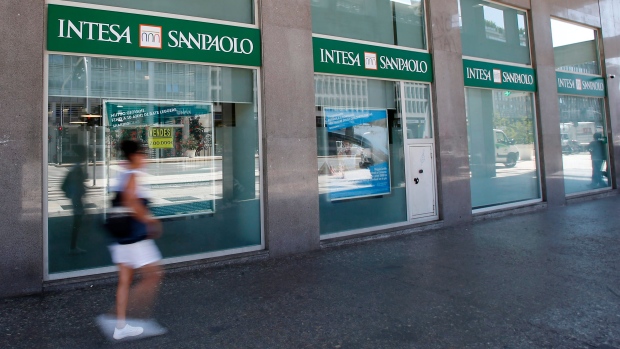Jun 26, 2017
Italy bank deal lifts Europe shares, U.S. dollar on back foot
, Reuters

Shares rose in Europe on Monday, with Italian banks gaining after a deal to wind up two failed lenders, while the dollar and U.S. bond yields held close to recent lows as subdued inflation raised questions over the outlook for monetary policy.
Wall Street looked set to open higher, according to index futures.
The-pan-European STOXX 600 share index rose 0.8 per cent, led higher by banks after the agreement under which Italy's largest retail bank, Intesa Sanpaolo, will take on the remaining good assets of collapsed Popolare di Vicenza and Veneto Banca.
Intesa shares rose 4.7 per cent. The Italian government will pay it 5.2 billion euros and give it guarantees of up to a further 12 billion euros.
"The announcement of definitive steps to resolve the two Veneto banks should be seen as a positive for Italian banks and the broader sector (albeit at a high cost)," said Jefferies analyst Benjie Creelan-Sandford.
Investors have long viewed the Italian banking sector as a major cause of fragility within the euro zone.
An index of Italian banks was up 2.7 per cent and the broader Milan market rose 1.5 per cent.
Italian 10-year government bond yields fell 4 basis points to 1.88 per cent, narrowing the gap over benchmark German equivalents to 164 bps.
"Negative consequences for the Italian state will be offset by the positive consequences for Italian government bonds in terms of reducing the already high uncertainty surrounding this issue," said BBVA strategist Jaime Costero Denche.
Greece's 10-year yields fell to their lowest since 2009 after Moody's upgraded its credit rating on Friday.
MSCI's broadest index of Asia-Pacific shares outside Japan ticked up 0.6 per cent as tech stocks led gains.
Trading was slow with many markets in the region closed for holidays to celebrate the end of Ramadan.
Japan's Nikkei rose 0.1 per cent.
Mainland Chinese shares rallied, with the CSI300 index rising 1.2 per cent to its highest in almost 18 months, after MSCI said the index provider could raise its weighting of China's mainland-listed 'A' shares.
The euro fell 0.1 per cent to US$1.1185, with the dollar edging up 0.1 per cent as the gap between short- and longer-dated U.S. government bond yields held close to recent 10-year lows hit on signs inflation is likely to remain subdued.
Investors greeted the election last year of U.S. Donald Trump as likely to lift inflation, and with it U.S. interest rates. But price pressures have remained subdued.
The Federal Reserve raised rates this month for the second time this year and has said it expects to raise again later this year. Futures imply only a 50 per cent chance of a further hike by December.
CENTRAL BANKERS
Fed Chair Janet Yellen speaks on London in Tuesday and investors will be on alert for any clues to the rate outlook, after mixed views from other Fed officials in recent days.
"The market continues to call the Fed's bluff on its intentions to change rates. I don't think anything (Fed chair) Janet Yellen can say this week will change that," said Stephen Gallo, head of European FX strategy with Bank of Montreal.
European Central Bank President Mario Draghi speaks on Monday, before a meeting of central bankers in Portugal later in the week.
The yen fell 0.4 per cent to 111.69 per dollar while sterling, on the up since more Bank of England policymakers have either called or said they are likely to call for higher interest rates, rose 0.3 per cent to US$1.2733.
A major cause of lower inflation globally has been a fall in oil prices in recent weeks on signs an agreement by producers in the Organization of the Petroleum Exporting Countries is failing to curb a global glut of crude.
Brent crude, the international benchmark, rose 12 cents, giving back most early gains as the dollar firmed, to US$45.66. Oil prices are down around 13 per cent since late May.
Dollar weakness also initially lifted copper. However, the industrial metal pulled back from an 11-week high as the greenback gained strength and stood at US$5,802 a ton, flat on the day.
Gold fell to its lowest in almost six weeks. Dealers cited the stronger dollar and a large sell order.







